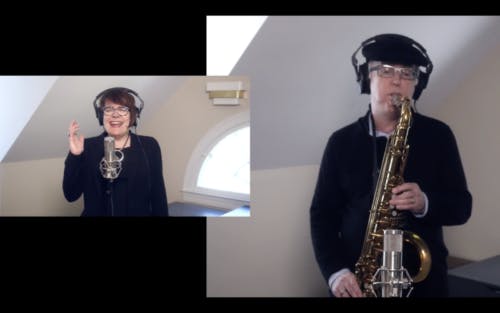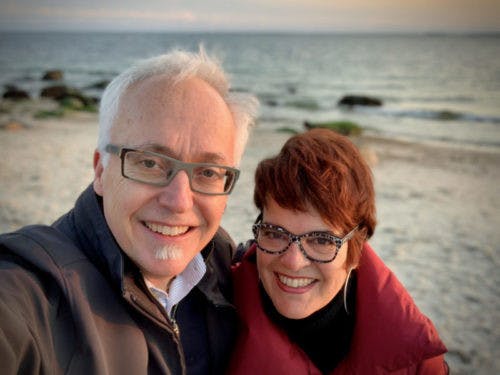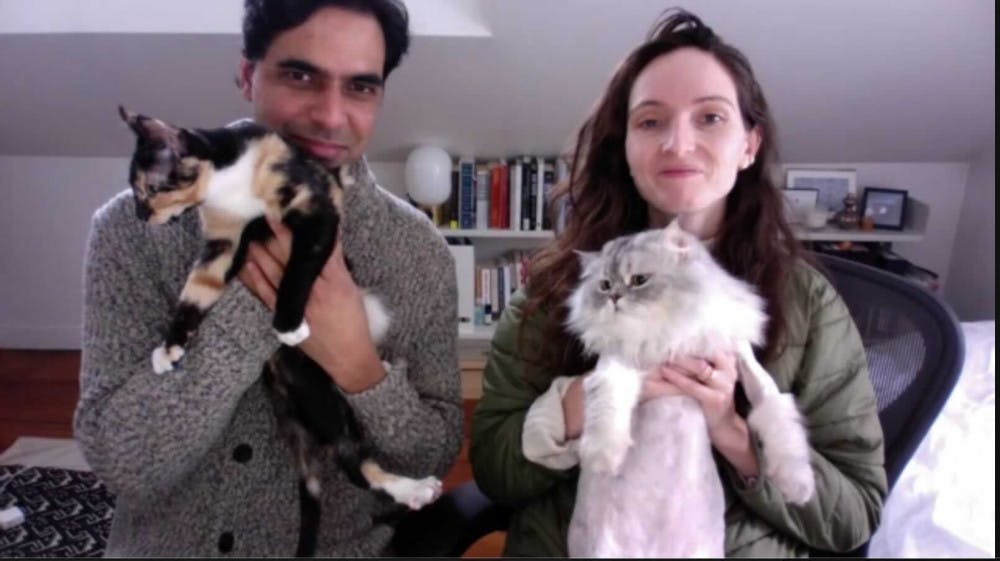When the University decided to send students home and make classes virtual back in March, not only did students have to adapt to new learning environments, but professors, particularly those married to each other, had to adjust to teaching classes from their homes. Three couples spoke to The Herald about the challenges and rewards of working from home together.
“The hazards of having a cat”
Karan Mahajan and Francesca Mari, two professors of literary arts who met 11 years ago at a party in New York, both teach from their Providence home –– Mari from their upstairs office, Mahajan from the dining room table.
Mari, who mostly teaches narrative nonfiction classes, didn’t start teaching at the University until September, while Mahajan, who teaches creative writing classes and seminars, transitioned to remote learning last March after starting at the University in 2018.
At the start of the fall semester, when they both were teaching in a virtual setting, Mahajan often found himself running up the stairs during class to shut Mari’s office door when he could hear her teaching. But it was their kittens who ended up posing more of a distraction during their classes than each did to the other.
Mari and Mahajan currently have two cats, Leonard and Lulu, adopting Lulu during the pandemic when they decided they would finally have enough time to take care of the two-week-old kitten, who needed to be bottle-fed.
“They like to come and start rolling on the keyboard when I’m teaching, and I have to tell my students at school that (I’m) bending down to put down my cat, or (that) this floaty fluffy thing that’s moving across the screen is not really my fault,” Mahajan said.
Mahajan and Mari both appreciate the benefits of teaching their classes remotely –– for example, being able to invite guest lecturers from around the world –– and also enjoy getting to spend time with each other immediately after their work ends.
“We developed a routine that we enjoy even as we both begin to slowly lose our minds,” Mahajan said.
An “extensive Google shared calendar”

For Hilary Friedman, visiting assistant professor of education, and John Friedman, professor of economics and international and public affairs at the Watson Institute, working remotely hasn’t made them any less busy with classes, but it has given them more time to spend with family.
The Friedmans both studied at Harvard as undergraduates but didn’t meet until several years later during their fellowships at the University of Cambridge in fall 2002. It took five years for them to realize they should date and get married, Hilary Friedman said, but John Friedman interjected that he knew all along. The couple started teaching at Brown together in 2015.
Before the pandemic, John Friedman would often travel to give lectures and conduct research, so the increased time he spends at home now allows their family to eat dinner together almost every evening, Hilary Friedman said. Now, she and her husband have also been able to put their kids to bed together most nights.
With John Friedman largely working from his office on campus, the pair found that it was easy to coordinate when one of them needed to use a space at home for meetings or to record a class. But they credited an “extensive Google shared calendar” for keeping their lives organized, Hilary Friedman said.
With the lack of after-school activities and babysitters due to the pandemic, they have to work together to coordinate their busy schedules to pick up their kids from school. But Hilary Friedman is grateful for how helpful her partner has been throughout the year.
“There’s so much coverage during the pandemic about how women have been impacted and that is 100 percent true, and it’s something I care very much about advocating for,” she said. “But I am very fortunate because as successful and busy as John is, he is definitely involved both around our home and with our kids.”
“Brainstorming around the kitchen table at night”

When the pandemic forced Joseph Rovan, professor of music and former faculty director of the Brown Arts Initiative, to work from home, he extended his sabbatical and decided to help his wife Katherine Bergeron, the University’s former dean of the College from 2006 to 2013, with her work as the current president of Connecticut College.
Rovan was finishing up a commissioned large orchestral piece when Connecticut College’s videographer was forced to quarantine after coming home from Europe last year. As president of Connecticut College, Bergeron needed to film several videos addressing the school, including graduation and Convocation.
Rovan, with a “basic skill set” in videography and his own orchestral work postponed, helped his wife film content across campus.
“I teach media at Brown, so it’s not like it’s outside my wheelhouse, but I had never done commercial video production,” Rovan said. “We all had to improvise, you just had to figure out how to make things work.”
When Bergeron and Rovan both worked at the University, they enjoyed teaching a class together, MUSC 0450: “On Songs and Songwriting.” When Bergeron left her position as dean of the College in 2013, the couple moved to Connecticut and Rovan started commuting to Brown, where he teaches MUSC 0450 by himself.
Rovan found that making videos together and collaborating on other music projects, which most recently involved Bergeron singing “Eleanor Rigby” in a Gregorian chant for Rovan’s songwriting class, has allowed them to spend more quality time together.
“Brainstorming around the kitchen table at night … has been so important,” Rovan said. “The kitchen table has been like idea central where everything gets laid out and we figure it out, and I think everyone can resonate with that because we’ve all been there trying to figure out, ‘okay what’s the next step?’”

“Something we couldn’t have done if the world were normal”
Though most couples are excited about the world going back to normal, some know they will miss rare quality time spent with their families and trying new things.
“It was fun to be able to adopt a two-week-old kitten who needed to be bottled,” Mari said. “That’s just something we couldn’t have done if the world were normal and we were going to class and away for hours at a time.”
The Friedman family has enjoyed a slower pace, especially without as much travel and as many after-school activities.
In the spring, when their kids had remote school, the couple particularly enjoyed giving their children a “cinematic education” with family movie nights.
“We watched movies like ‘E.T.’ and ‘Back to the Future,’ and we just had more time to do that,” Hilary Freidman said. Now, Friday is “Family Movie Night” and Saturday is “Family Game Night,” traditions they hope to maintain going forward.
Rovan also feels that he became a lot closer to his wife during the time they spent together this past year.
“One of the wonderful things about being a couple is that you face challenges together,” he said, “whatever they are.”

Gaya Gupta was Senior Editor of Digital News for the 132rd Editorial Board. She previously covered diversity on campus. She is a junior from the San Francisco Bay Area studying computer science and English.





